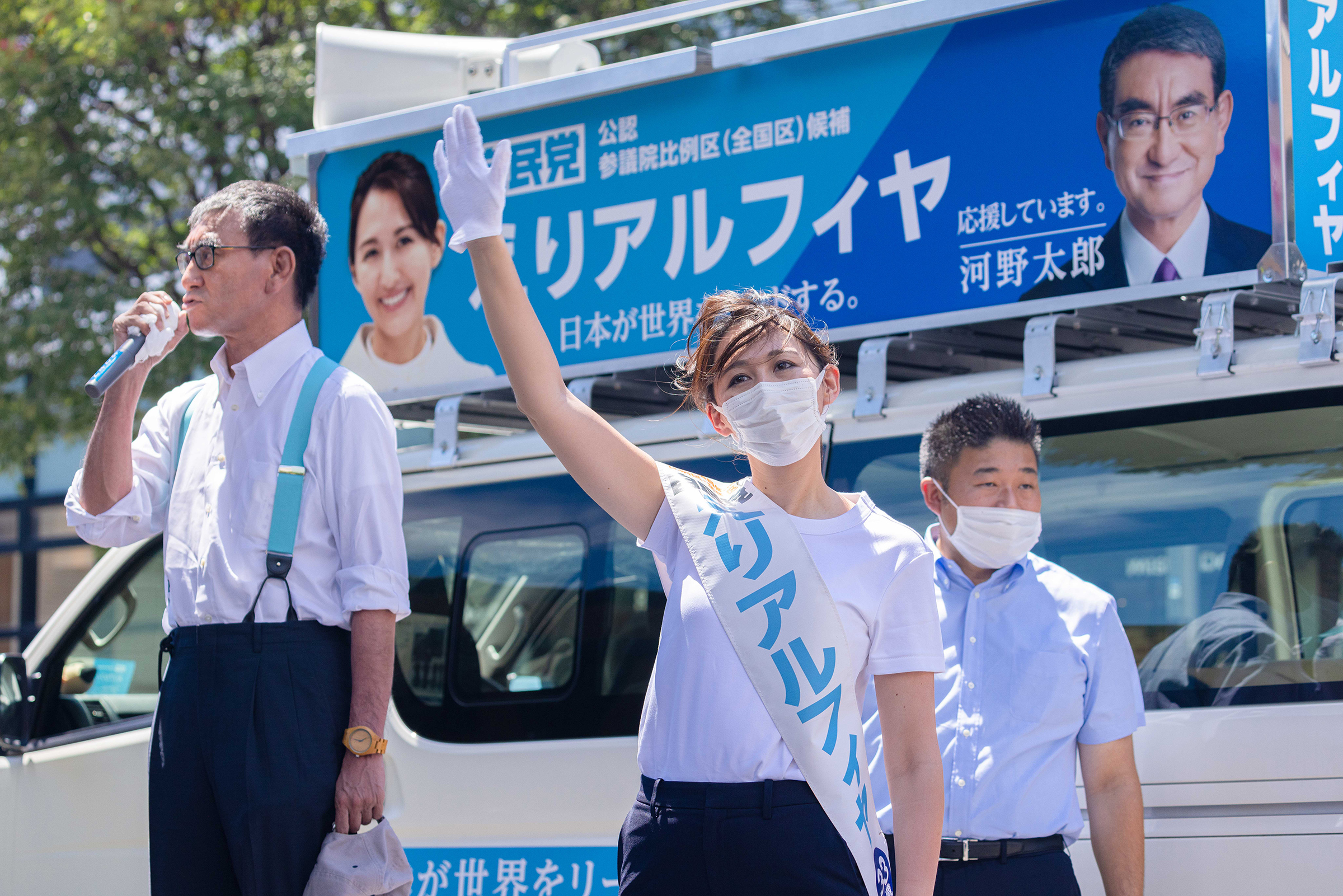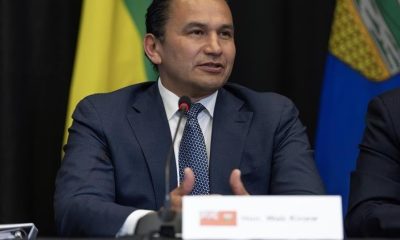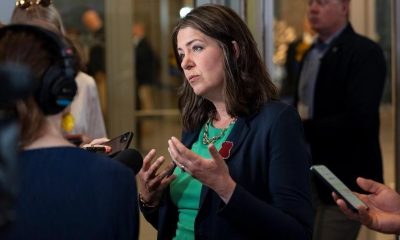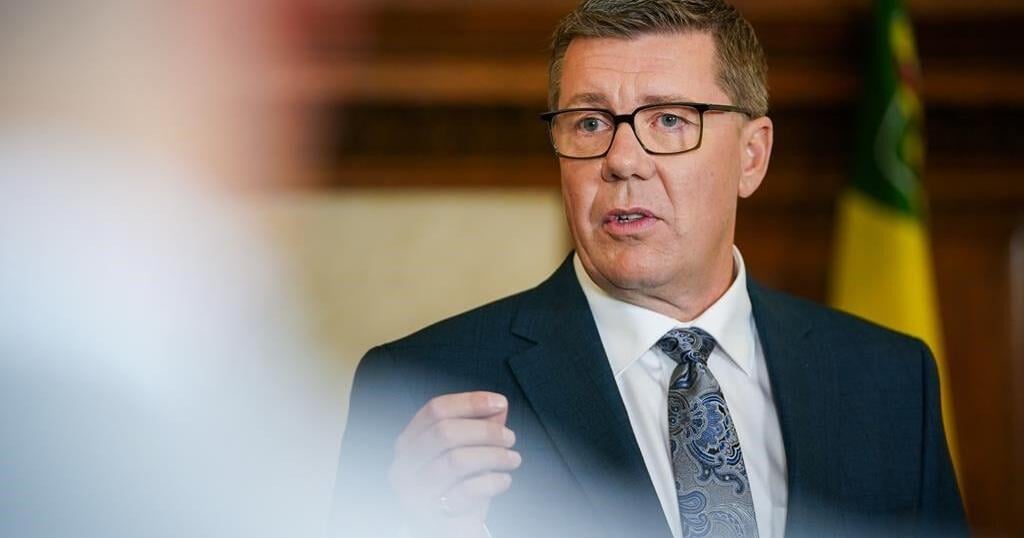Arfiya Eri knows she stands out in Japan’s government today. “Going in and out of Parliament now,” the 34-year-old tells TIME in an interview after her election last month, “there are very few people still in the system who look like me.” Eri’s hoping, however, that in the future that won’t be so—and that she will have played a part in the transformation.
A relative political novice, Eri—who was born in Kitakyushu, Fukuoka, to a Uyghur-Japanese father and an Uzbek-Japanese mother, was educated at Georgetown, and previously worked for the United Nations and the Bank of Japan—ran for a seat in Japan’s upper house last year and lost. But she was undeterred. When by-elections were held in the Chiba prefecture after a corruption scandal forced its former lower-house representative to resign, she threw her hat in the ring, and, although she had no ties to the area, she emerged the poll victor on April 24.
“It really didn’t sit in with me until quite recently,” she says, “but I feel a great sense of honor and responsibility.”
Eri, of course, is not out to alienate the old guard. She’s a member of Japan’s ruling Liberal Democratic Party, or LDP, and she had the prominent backing of one of the most popular politicians in the country, Taro Kono, who currently serves as digital minister. She’s also come out strongly in favor of Prime Minister Fumio Kishida’s positions on reasserting Japan as a military power—a stance she has said is informed by both her background as the descendant of Uyghurs, who have suffered and continue to suffer human rights abuses in Xinjiang, China, as well as her concerns about the ongoing invasion of Ukraine and the impending threat toward Taiwan.
“I think it’s incredibly important that Japan, as the strongest democratic economy in Asia, takes the role of steering that leadership forward and making sure that our international rule-based order is in place, making sure that values like democracy and human rights are protected in the global arena,” she says.
At the same time, Eri’s seemingly strongest belief is that Japan domestically has a long way to go in terms of representing the true breadth of its people. Japan has long struggled with gender parity and racial inclusivity at the highest levels of both its public and private sectors. But Eri is adamant that Japan is in fact a cosmopolitan country. Despite her mixed-race heritage, she insists that she’s always felt Japanese. The people in power, she suggests, are simply lagging behind in reflecting the country’s true diversity. Perhaps, she hopes, she can be a catalyst to change that.
This interview has been edited for length and clarity.
How did you get into politics?
My interest in politics was first triggered when I was observing a gubernatorial race in my home prefecture in Fukuoka in 2021. Initially, a lot of the candidates that were being brought forward by the media or other sources, I noticed, were all male and of a specific age group and of a specific career background.
Having been born and raised in Fukuoka myself, I knew very much that we had a lot of women who are active in various industries, and we have a lot of diverse populations who would be very much qualified to run for office. And I was very much shocked—as a U.N. officer observing this from New York—that my prefecture still didn’t have this type of political representation. I felt a certain level of urgency to find out why that was.
When I looked into it more, I found out very quickly that, of course, if Fukuoka was that way, the rest of Japan was very similar. Even in our parliament today, in our lower house where I am, women still don’t make up even 10% of the entire representatives, while we have 50% of our population as women. That level of lack of representation, I think, is something we should take seriously as a democracy.
And that’s what triggered me to sort of try to be the change myself. I haven’t seen anyone who looks like me in politics. I don’t feel represented in my democracy. And if I feel that way, perhaps more people also feel that way. And if I want to see change, I should probably be the change myself.
You have previously said in interviews and speeches that Japan is already a diverse country, but that it’s just not visible. How do you square your push for greater diversity with your membership in a conservative party like the LDP, which has long been dominated by older men?
The LDP is most certainly an old boys club. But we recognize that it’s an old boys club, and I think that’s a really good start. We’ve never had a female prime minister. And we are a party that recognizes that we have that history.
The bad news is that the numbers show that we still lack representation. But the good news is that across the board, all political parties in Japan, I think, are in agreement that we need more female representation and we need more diverse voices.
I would argue that conservatism, as the LDP sees it, and the way we see it in Japan is truly united with this idea of freedom and respect for democracy. I know that conservatism often gets characterized as something that’s contrary to inclusion, but I just don’t think that’s true. I would argue that respect for diversity and inclusion and representation is actually very much in line with what we stand for, which is the ability of each and every person in Japan to have free thought, free speech, and also have access to democracy.
If we don’t have good representation in our democracy, then, you know, how good is it, right? So I actually think that the LDP is a great place to make that argument and push that argument forward. And I also think that there is much more significance in someone like myself or other folks, who might be from identities that haven’t been represented before, being represented within the LDP and pushing Japan’s policy forward from the inside that way.
I’ve always also expressed that while my multiple identities get a lot of attention in the political discourse, I always believe that our democracy should first and foremost should be about ideas and principles, and what we’d like to bring to the table and how we’d like to serve our community. And that’s what I’ve really focused on during my campaign as well. And I know that that’s what resonated with my constituency.
As someone of Uyghur ethnicity, do you think Japan needs to do more to help Uyghurs in China? And does Japan need to do more in general for immigrants or refugees?
Having worked on human rights for a long time myself, I don’t think there is any rank to human rights violations. Every violation is a violation. But that said, in the Uyghur region, I think we are seeing, frankly, one of the worst cases of human rights violations of our time. And I think it is a test to the global community as to how you react to this.
In terms of how Japan can respond, I definitely believe that we need to continue our discussions with our democratic allies and our partners who believe in the same human rights values. I also think that there needs to be further discussion on what we can do in terms of supply chain due diligence, making sure that tainted forced labor is not coming into our own supply chains. And I think we also need to look at exports, making sure Japanese technology is not being used for human rights violations.
In terms of immigration, I really do believe that when it comes to refugee and asylum policy, we need to have a much more consistent and much more human rights based approach to that. In terms of other forms of immigration, I think that we have to be very careful here in Japan and consider with a lot of thoughts and a lot of discussion. Mainly because, as a child of immigrants myself, I very much recognize that I don’t think we have the infrastructure to welcome people here yet. I personally would welcome all people in Japan feeling secure and feeling free and feeling empowered when they land in this country, whether they’re visitors or whether they’re residents or whether they’re citizens. And I think that’s one of the things we should aspire for.
I think there’s also a lot bigger avenues for us to provide safe and secure life for Uyghurs who are in Japan, both who are naturalized and who are not yet naturalized, making sure that they are safe here that they can stay here as long as they wish, and that their life is supported and cared for. Japan has around 2,000 to 3,000 estimated Uyghurs living here. Most of them are highly educated and have come here not as refugees but as scholars, and so a lot of the Uyghurs here tend to be already settled into their lives. They tend to have jobs, they tend to speak Japanese well, they’re very much integrated into the community.
But I think one of the things that’s missing, being from the community myself, in terms of political discourse on this, is really paying attention to the hardships that this community faces because they have family in the region. And so a lot of their life is secure and safe here and is already established here. They live well here. But that doesn’t discount the fact that a lot of folks in the Uyghur community here live in despair and fear every day for what is happening to their families back home. So we could provide something along the lines of mental health care to these communities. And not just Uyghurs but also other communities in Japan, like Ukrainian refugees, Rohingya, and other communities who are going through similar experiences. How can we provide better mental health care, better life care for them in ways that makes their life here more secure and comfortable than it already is?
Data show that fewer people have been casting ballots for local and national elections since the LDP returned to power in 2012. What do you think needs to change to better engage more voters?
There’s multiple aspects to this. like one, I think, is engaging younger voters. I really do believe that in Japan, because of the lack of age representation or generational representation in Japanese politics, we haven’t been able to engage the Japanese youth as much in political discourse and political participation. And what I see from the ground actually engaging with young people in my constituency during my campaign, for example, is that it’s not that they’re not interested in politics. It’s that they often don’t find candidates who they think represent themselves or who they think they might be able to talk to. In terms of engaging the youth, I think representation is key: the more candidates we have who are closer to the age group of our youth voters, I think the more they would feel represented in politics and be more interested in raising their voice.
There used to be much less incentive for voters to be engaged in political discourse, because it’s like: the media is doing the watchdog thing for us, and the politicians are representing us in Tokyo, and the LDP has been a ruling party for a long time, and everything is stable, it’s peaceful, it’s good. I would not generalize it that way. I would caveat that there are exceptions to that, including what happened in my constituency before I ran. Like we have to be frank about the fact that the by-election in my district, this time happened because of a political scandal. When these things happen, there is raised interest in politics, because people then have opinions about what kind of candidacy you’d like to see instead of the previous case. But I think we need to be moving towards—and I think we are moving towards—politics that really moves in alignment with the people. So candidates who reach out to constituents, candidates who discuss with constituents, candidates who are available to constituents, including social media, but also on the ground. I would add that being more of an accessible politician and a reachable politician, I would hope, would raise the interest of constituents to politics as well.
When people read about you, especially from outside Japan, what do you hope that they take away?
One of my main motivations to continue within politics is to make sure that the true image of Japan is presented to the world. Japan already is a diverse country. We have many diverse faces succeeding here in Japan: folks who are bilingual or multilingual, folks who are of multiethnic backgrounds and origin, folks who have lived in Japan and also abroad, folks who have foreign names just like myself, folks who are women, folks who are men, LGBTQ folks. If you look at the actual Japanese society, if you come and visit Japan, and especially Tokyo, I think you’ll see with your own eyes how diverse and vibrant this country is and has always been.
I think we’re just not seeing that represented in politics, and I really do hope to be one of many faces of Japan that people get to see from abroad that are not your stereotypical image of homogenous Japan. We are very much a vibrant and diverse country. And I think we are an awesome country. And I think a lot of that comes from diversity of lifestyles and appreciation of free thinking and free thought here. And so I really do hope to be able to represent that aspect of Japan—how welcoming this country is, despite the various issues that we have, as you do in any other evolving democracies.
And second, I have to mention as a representative of Urayasu and Ichikawa now, I would love for foreign visitors to come and visit our constituency. It’s 30 minutes away from Tokyo. Urayasu is home to Tokyo Disneyland but also so much more. Both cities are home to a wealth of Japanese traditions, including famous Japanese festivals. They are also home to beautiful riversides and water sights and cherry blossom alleyways. It’s a little quieter escape from Tokyo, and I really do hope that folks find a time to come visit us there as well.
I’m very proud to be representing two cities—Ichikawa and Uruyasu—which I believe are, frankly, you know, two of the most diverse I would say in terms of age groups, representation, career backgrounds, and backgrounds of where people come from. So I’m very proud to be representing two cities that I think are symbolic of the future of our country. And I think the very fact that they’ve chosen me as a representative, I think says everything.
More Must-Reads From TIME



































